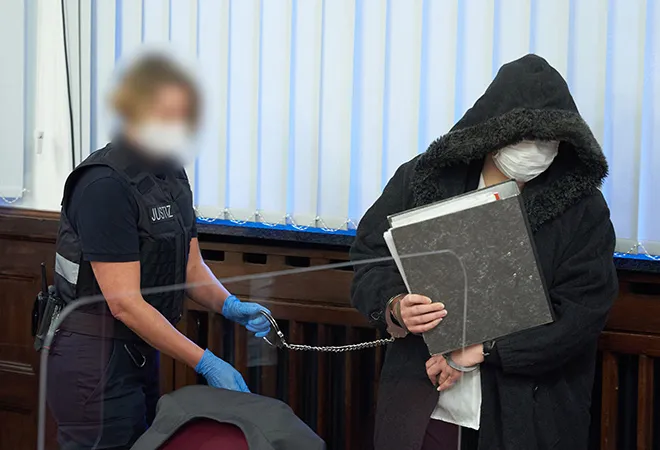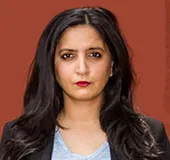
The Higher Regional Court in the city of Koblenz, Germany, is the first in the world to conduct a trial against Syrian regime officials accused of committing war crimes. Albeit limited, it provides hope of justice to Syrians who lost their loved ones in the country’s infamous prison system since the uprising began in 2011.
Human rights lawyers are slowly but steadily presenting evidence meticulously collected, often at high risk, over the last nine years of the Syrian civil war. Testimonies of victims of torture in prisons, regime insiders, journalists, and prison officials are being presented to the court.
The ongoing trial is against a mid-ranking official, Anwar Raslan, and a junior official, Eyad el-Gharib. Anwar was in charge of the Al-Khatib interrogation-cum-detention centre in Damascus, under whose command allegedly 4,000 people were tortured and 58 died. Eyad was Anwar’s junior colleague and has been charged with torture in thirty cases.
Human rights lawyers are slowly but steadily presenting evidence meticulously collected, often at high risk, over the last nine years of the Syrian civil war.
The trial in Koblenz, however, is significant for all those who were forcibly disappeared, tortured, and killed, allegedly, on the orders of top echelons of the Syrian government. According to international human rights organisations, the number of victims runs into multiple thousands and 127,000 are believed to be languishing in prions still.
Whilst the case is against just two officials, the idea is to prove that the crimes were committed in a systematic manner. Lawyers say that the current trial allows them to lay the legal groundwork for future possible cases too. They hope that when high-ranking regime officials — against whom there is an international arrest warrant — travel abroad, they may be able to arrest them and put them on trial too. And even though it may seem far-fetched to think that one day Russia might abandon Assad and deny him the immunity granted to a head of state at the International Criminal Court, it is within the realm of the possible. For years Russia and China’s veto protected the Syrian officials from being tried at the International Criminal Court.
This year, Germany activated the principle of universal jurisdiction enshrined in the German Code of Crimes, which allows it to prosecute international crimes no matter who committed them, where they were committed, or who they were committed against.
For years Russia and China’s veto protected the Syrian officials from being tried at the International Criminal Court.
Activists hope that the prosecution of Anwar Raslan and Eyad el-Gharib will give confidence to other national prosecutors in Europe that they too could successfully build and present cases against senior Syrian officials for international crimes under the principle of universal jurisdiction.
It might also pave the path for investigating similar crimes committed by other autocrats and draw attention to ongoing atrocities, such as the plight of detainees still being held and tortured in government prisons in different parts of the world.
So far in the Al-Khatib trial, the testimonies are all pointing to one conclusion: different security branches of the government, including intelligence services and military forces, were involved in carrying out illegal arrests, brutal physical harm, and disposing of the bodies of those killed in an organised manner.
One particular testimony of an undertaker, whose job was to transport men who buried the bodies in government-controlled graveyards and to note down the numbers of the buried against the name of the security branch they died in, contended that such executions were carried out until late 2017.
Dramatic details have been picked by the press and noticed by the international community and that has made life harder for those in the West who had started to propose normalisation with Assad.
The undertaker was simply referred to as witness Z in the court as his lawyers said he feared that his family members, who were still in regime-controlled Syria, may be targeted if his identity was made public.
“There were rivers of blood and maggots flowing out of corpses,” he told the court and added that the corpses were “rotten” and faces “unrecognisable.” The smell of the dead has continued to chase him and still gives him nightmares, witness Z stated.
These dramatic details have been picked by the press and noticed by the international community and that has made life harder for those in the West who had started to propose normalisation with Assad.
Assad’s victories on the battlefield with Russian support forced the West to not seek a regime change but a change in regime behaviour towards its people.
Biden is expected to take a pragmatic approach and focus on deliverables from the Syrian government.
However, as this case goes forward and others are filed and heard in different courts across Europe, as activists hope, Assad and his government may never be accepted by the US and Europe.
Biden is expected to take a pragmatic approach and focus on deliverables from the Syrian government. His team does not expect Assad to indict himself and give up political control but it won’t relent on the demand for the release of political prisoners either.
The road to justice in cases of international crime might be long and arduous but Germany is trying to tell the world that that is no reason to give up.
The views expressed above belong to the author(s). ORF research and analyses now available on Telegram! Click here to access our curated content — blogs, longforms and interviews.




 PREV
PREV


